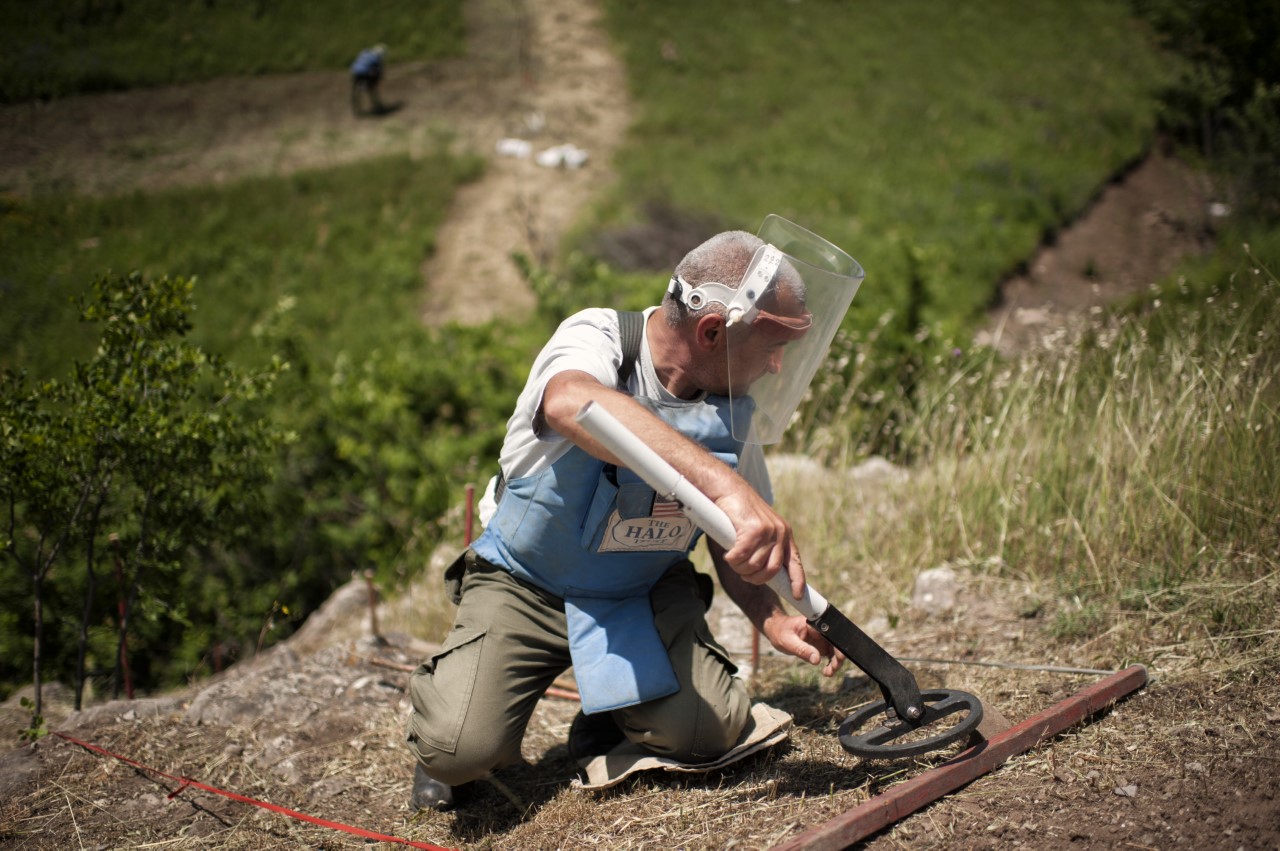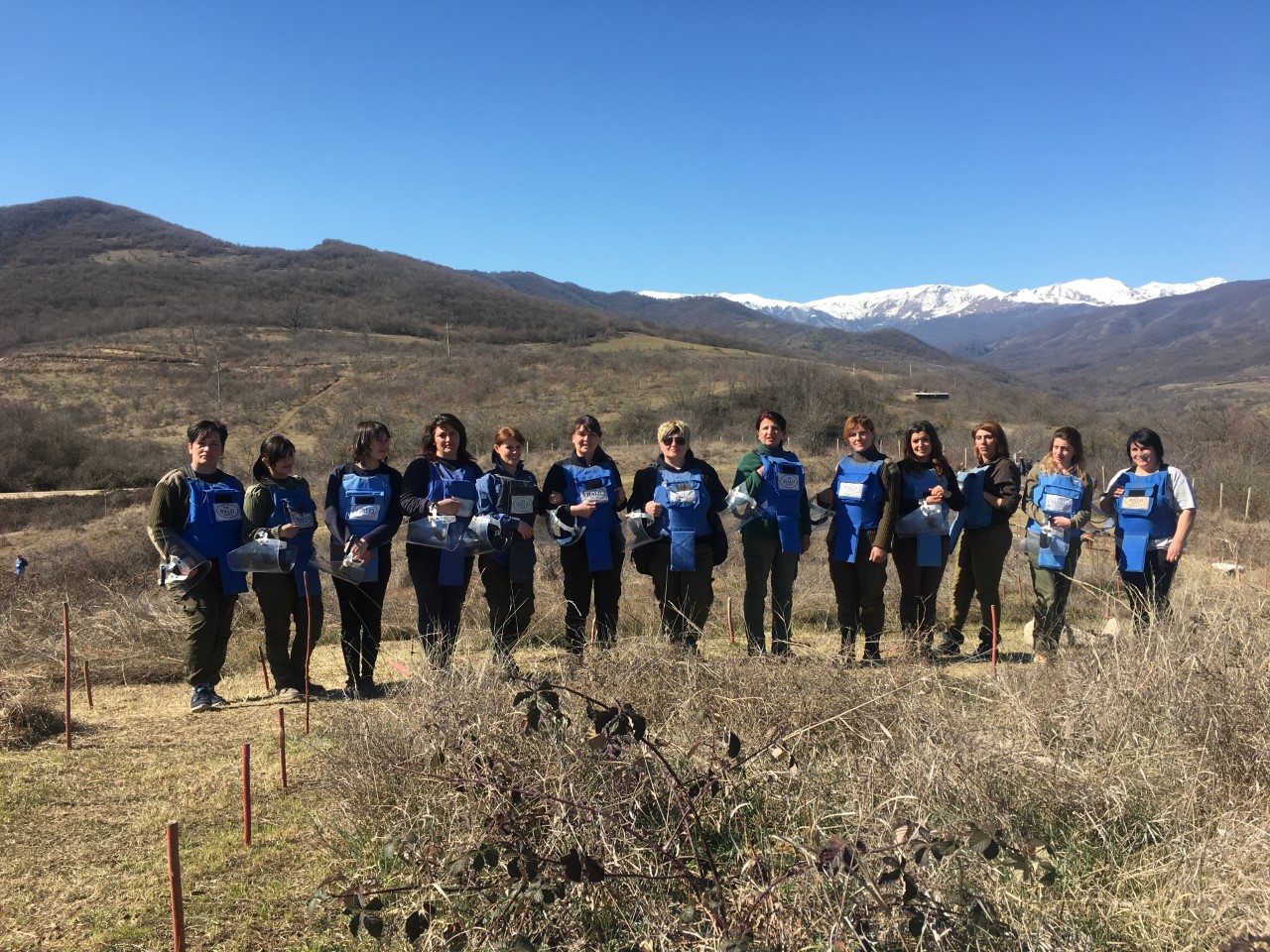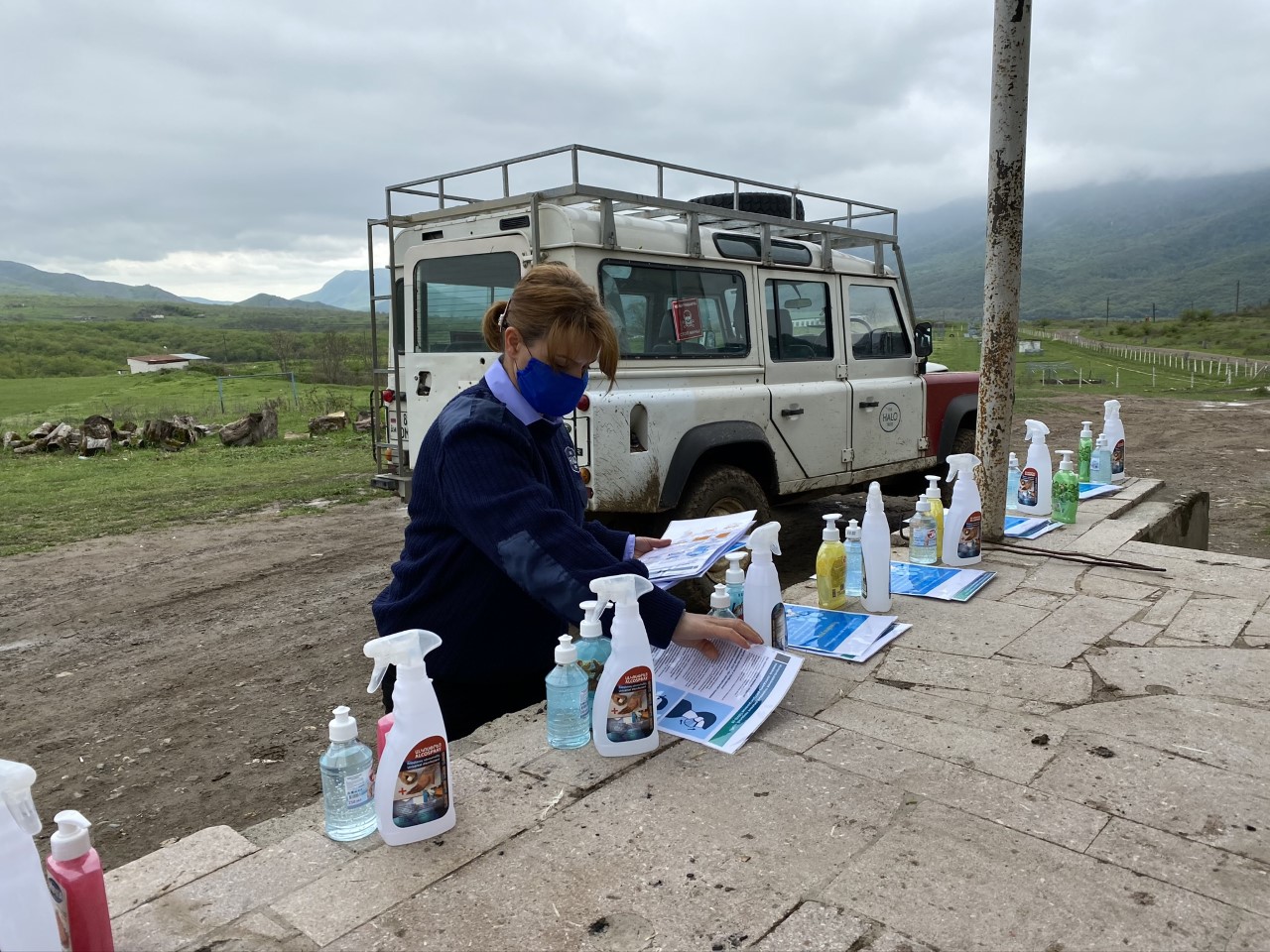Halo deminer in action in Artsakh. Photo by Scout Tufankjian
Since 2000, HALO Trust deminers have cleared over 47 million square metres of minefields and have destroyed nearly 12,000 landmines in various regions of Artsakh where people have been endangered by the presence of explosives since the 1988-94 Artsakh War. The non-profit NGO also visits schools and communities to teach people, especially children, how to stay safe in proximity to landmines.
The humanitarian organization receives its funding from western countries, primarily the US. But recently the U.S. government halted its funding of Halo Trust in Artsakh arguing that the program objectives have been completed and the need to direct resources to higher priorities in the region.
In April, Senator Bob Menendez submitted a letter to the Senate Foreign Operations Related Programs Appropriations Subcommittee requesting $1.5 million in the Fiscal Year 2021 budget for USAID’s humanitarian demining program in Nagorno Karabakh. Thirty other senators also signed the letter.
The organization’s efforts, which employ hundreds of locals, is highly dependent on this support alongside other individual donations.
“TorontoHye” conducted an email interview with Rob Syfret, HALO Nagorno Karabakh Programme Manager, where he talks about various projects the organization implements in Artsakh and the importance to continue the funding to bring the demining of the region to completion.
———————
Q. For around 20 years, Halo Trust has been involved in mine clearing in Artsakh. Now, when the US Government stops funding, how will the organization be able to continue its demining activities in Artsakh. Are there other donors that support you?
A. We are very grateful to the U.S. Government for their support the last two decades and hope that USAID funding for humanitarian demining in Nagorno Karabakh will become available again in the near future.
Currently our only funding is from the generosity of private individuals. These include benefactors of private philanthropic foundations who have seen the value of our work and been engaged with us for several years. Generous individuals, who have been moved by the plight of the people of Karabakh, have also donated directly through our website or via our fundraising campaigns.
Of course, the Armenian diaspora globally has likewise been instrumental in supporting our program both financially and through advocacy, and we hope that individuals and communities in the diaspora will continue to help make our humanitarian work in Karabakh possible. We are also extremely fortunate to have a donor who is currently matching all gifts that we receive, dollar for dollar. This has made an enormous difference and is what is allowing us to continue our work today. (Donations can be made on our website: https://www.halotrust.org/where-we-work/europe-and-caucasus/nagorno-karabakh/.)
Q. How long has HALO been working in Artsakh and how much area has been cleared and how much area is left to be cleared?
A. Since 2000, HALO has been the only humanitarian organization clearing landmines in Karabakh. We are also one of only two international organizations providing humanitarian support in Karabakh at all and are the only international organization that reaches the civilian population living outside the Soviet-era boundaries of the Nagorno Karabakh Autonomous Oblast.
In the last two decades, we have cleared over 47 million square metres of minefields and have found and destroyed nearly 12,000 landmines. In addition to landmines, we have found and destroyed nearly 250,000 other explosive remnants of war, including cluster bombs and air-dropped bombs. Demining has reduced the number of landmine accidents in Karabakh, which has one of the highest per capita accident rates in the world. Landmine clearance has also improved the socioeconomic well-being of Karabakhis, many of whom rely on their fertile land to feed themselves and their families.
Last year, we launched the Nagorno Karabakh National Survey Project, with the goal of conclusively mapping out the remaining landmine contamination in the entirety of Karabakh. The project is being undertaken in a systematic manner, with our survey teams visiting every single community to establish exactly how much clearance remains to be achieved before Karabakh is Mine Impact Free.
Q. In Artsakh how many people are provided with work at your organization?
A. For many years now, HALO has been one of the largest employers in Karabakh. We focus on the employment of local men and women, often those who come from mine-impacted communities. Currently, we employ 148 Karabakhis. In the past, we have been able to employ over 270 people. Our ability to employ more people is heavily dependent on available funding. If more becomes available we will increase our staff numbers again.
Q. Does HALO conduct only mine clearance activities or are there any other programmes that you implement in Artsakh?
A. In addition to clearance and survey, we conduct the following activities in Karabakh:
- Mine Risk Education (MRE): For families living in landmine-impacted communities, MRE is a matter of life and death. MRE teaches people how to stay safe while we work to remove the explosives for good. MRE targets those who are at highest risk of becoming victims of an accident. In Karabakh, a quarter of all accident victims are children. Therefore, we have developed and use a variety of tools tailored toward children to teach them about the dangers of landmines and other explosive remnants of war, and teach them basic rules to stay safe. Farmers and shepherds also represent a high-risk group. Nearly 40% of all victims were engaging in agricultural activities at the time of the accident. In the last several months, there have been about a dozen occasions when farmers have been fortunate enough to plough items without detonating them or have been involved in the explosions of munitions but by chance escaped injury or death. Our MRE team ensures that farmers and shepherds receive life-saving risk education.
- Explosive Ordnance Disposal (EOD): When a member of the community finds a landmine or another explosive remnant of war, they report it to HALO. Our EOD teams immediately respond to all reported items. The team will safely remove and destroy the hazardous item, ensuring that it does not harm or kill anyone.
Q. In the current situation, when Coronavirus has already reached Artsakh, do you conduct any activities against the pandemic?
A. As one of only two international organizations in Karabakh, we see it as our responsibility to ensure no community is left behind during this global pandemic. We have the manpower, ambulances and scale to make a difference and protect Karabakhi families from the threat of COVID-19.
To date, HALO has supported Karabakh with the following:
- Donated 1,000 facemasks to the Central Republican Hospital in Stepanakert, which will be used by approximately 200 medical staff.
- Distributed over a hundred hygiene kits and hygiene messaging to six villages, reaching over 400 people, with more planned.
In addition to this, HALO is conducting preparations to conduct further activities should the situation deteriorate, including:
- Preparing HALO ambulances with airtight seals between the passenger and driver compartments to allow the safe transport of infectious patients.
- Planning further distributions including food supplies that will allow households to reduce the risk of infection during travel to markets, and help reduce the economic impact of COVID-19 on the poorest households.
- Developing a mapping capacity to track the progress of the outbreak.
HALO Nagorno Karabakh has also offered the assistance of personnel, vehicles and management capabilities to the authorities of Karabakh and also Armenia in any other manner necessary to reduce the impact of COVID-19 on the population.
Donations to the COVID-19 emergency response fund for Nagorno Karabakh can be made here: https://www.halotrust.org/latest/halo-updates/stories/nagorno-karabakh-covid-19-emergency-response/.




